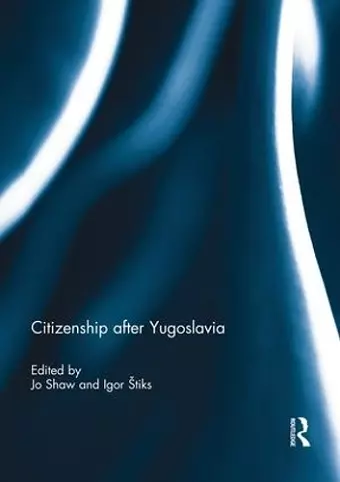Citizenship after Yugoslavia
Jo Shaw editor Igor Štiks editor
Format:Paperback
Publisher:Taylor & Francis Ltd
Published:14th Aug '15
Currently unavailable, and unfortunately no date known when it will be back
This paperback is available in another edition too:
- Hardback£145.00(9780415523288)

This book is the first comprehensive examination of the citizenship regimes of the new states that emerged out of the break up of Yugoslavia. It covers both the states that emerged out of the initial disintegration across 1991 and 1992 (Slovenia, Croatia, Bosnia-Herzegovina, the Federal Republic of Yugoslavia and Macedonia), as well as those that have been formed recently through subsequent partitions (Serbia, Montenegro and Kosovo). While citizenship has often been used as a tool of ethnic engineering to reinforce the position of the titular majority in many states, in other cases citizenship laws and practices have been liberalised as part of a wider political settlement intended to include minority communities more effectively in the political process. Meanwhile, frequent (re)definitions of these increasingly overlapping regimes still provoke conflicts among post-Yugoslav states.
This volume shows how important it is for the field of citizenship studies to take into account the main changes in and varieties of citizenship regimes in the post-Yugoslav states, as a particular case of new state citizenship. At the same time, it seeks to show scholars of (post) Yugoslavia and the wider Balkans that the Yugoslav crisis, disintegration and wars as well as the current functioning of the new and old Balkan states, together with the process of their integration into the EU, cannot be fully understood without a deeper understanding of their citizenship regimes.
This book was originally published as a special issue of Citizenship Studies.
'Overall, Citizenship after Yugoslavia is a book for all those interested in at least one (but preferably, a combination) of the following: the causes and implications of the disintegration of the former Yugoslavia; addressing the issue of citizenship beyond legal considerations; and post-conflict democratization and nation-state building. However, even those scholars and students focusing on human rights, ethnic/religious identities, and regional (dis)integration in a broader, comparative sense would find valuable insights in this book.' - Nenad Rava completed a PhD at the Centre for the Study of Political Change (CIRCaP) at the University of Sienna, in which he examined the relationship between the quality of democracy and nation-state integration. Since 2001, he has worked as consultant for UN agencies, the EU, the World Bank, the OECD, and bilateral donors
ISBN: 9781138945135
Dimensions: unknown
Weight: 294g
158 pages